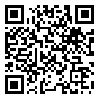Volume 11, Issue 4 (2-2024)
2024, 11(4): 1-10 |
Back to browse issues page
Download citation:
BibTeX | RIS | EndNote | Medlars | ProCite | Reference Manager | RefWorks
Send citation to:



BibTeX | RIS | EndNote | Medlars | ProCite | Reference Manager | RefWorks
Send citation to:
A B, S V, A I, F B, M H. Explaining nurses' experiences of breaking the law in patient care: a qualitative study. Journal title 2024; 11 (4) :1-10
URL: http://jms.thums.ac.ir/article-1-1247-en.html
URL: http://jms.thums.ac.ir/article-1-1247-en.html
1- birjand university of medical sciences
2- birjand university of medical of sciences
3- Jundishapur University of Medical Sciences.Ahvaz
2- birjand university of medical of sciences
3- Jundishapur University of Medical Sciences.Ahvaz
Abstract: (224 Views)
Background & Aim: breaking the law in caring for patients is one of the important and main pillars of ethical principles in nursing. This study was conducted in the form of a qualitative study in order to examine the experiences of law-breaking nurses in patient care
Methods: In this qualitative study, 15 experienced nurses from the Valiasr research educational center affiliated to the Birjand University of Medical Sciences, living in 1401 South, participated in this qualitative study. The sampling method was purposeful and collected through semi-structured individual interviews. The method of qualitative analysis was phenomenology with Man Vanen and with the help of 10MAXQDA software.
Results: interviews with the participants regarding business in breaking the law in nursing care, the emergence of two main classes: the first class is escape from punishment and the second class: inattention of the authorities, escape from punishment: which includes 3 classes: a) forced silence b) illness c) Compulsory lawlessness and the second class, which recklessly took its officials, including the two subclasses of mutual retaliation and slave nurse.
Conclusion: The results showed that there is a positive positive error report in nursing and it should be strengthened more and above all in nursing and human rights in nursing should be implemented by the authorities to protect nurses. Not enforcing the rules by nursing officials.
Methods: In this qualitative study, 15 experienced nurses from the Valiasr research educational center affiliated to the Birjand University of Medical Sciences, living in 1401 South, participated in this qualitative study. The sampling method was purposeful and collected through semi-structured individual interviews. The method of qualitative analysis was phenomenology with Man Vanen and with the help of 10MAXQDA software.
Results: interviews with the participants regarding business in breaking the law in nursing care, the emergence of two main classes: the first class is escape from punishment and the second class: inattention of the authorities, escape from punishment: which includes 3 classes: a) forced silence b) illness c) Compulsory lawlessness and the second class, which recklessly took its officials, including the two subclasses of mutual retaliation and slave nurse.
Conclusion: The results showed that there is a positive positive error report in nursing and it should be strengthened more and above all in nursing and human rights in nursing should be implemented by the authorities to protect nurses. Not enforcing the rules by nursing officials.
Type of Study: Research |
Subject:
Special
Received: 2024/01/10 | Accepted: 2024/04/15 | Published: 2024/04/16
Received: 2024/01/10 | Accepted: 2024/04/15 | Published: 2024/04/16
Send email to the article author
| Rights and permissions | |
 | This work is licensed under a Creative Commons Attribution-NonCommercial 4.0 International License. |






